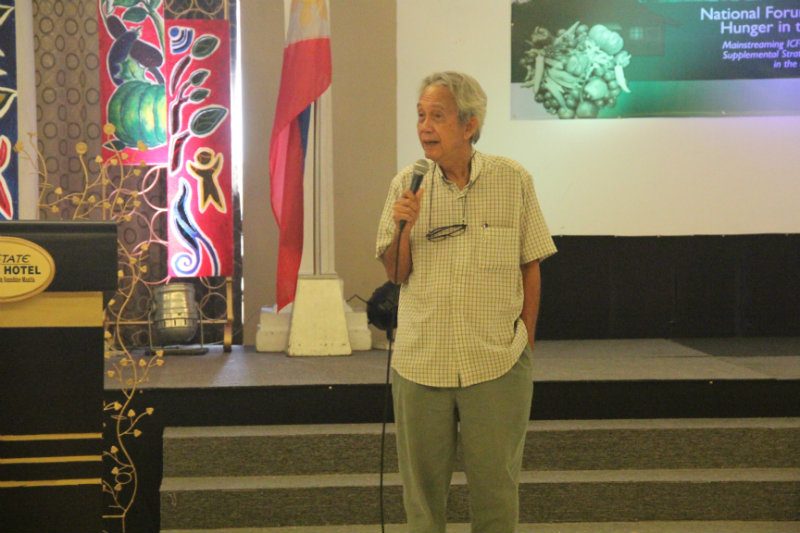SUMMARY
This is AI generated summarization, which may have errors. For context, always refer to the full article.

MANILA, Philippines (UPDATED) – The outgoing chief of the National Anti-Poverty Commission (NAPC) has called on government beneficiaries to defend the Aquino administration’s key reforms topped by bottom-up budgeting (BUB).
Secretary Joel Rocamora, NAPC lead convenor, made the call in his speech at the National Hunger Forum at the Citystate Tower Hotel in Manila on Friday, June 10.
While he called on beneficiaries at the event to be open to the expected new initiatives of the incoming administration, Rocamora also expressed concern that some key pro-poor reforms of the Aquino administration may be at risk of being altered or scrapped by the new leadership.
“Dapat alam natin ano sa mga reporma ng Aquino administration ang dapat i-dedefend sa bagong administration. Tingin ko, isa sa pinakaimportante ay ang bottom-up budgeting,” he said.
(We should know which reforms of the Aquino administration to defend. I believe one of the most important is the bottom-up budgeting)
Rocamora said he received unconfirmed information that the incoming administration of President-elect Rodrigo Duterte is looking into turning the BUB into a “much smaller program” that covers only poor municipalities.
The BUB is a program under the Aquino administration that allows LGUs, civil society organizations, and non-governmental organizations to have their projects funded by the national government.
From a program that covered 609 poor municipalities when it was first implemented in 2013, this year, it is implemented in all municipalities and cities across the country, NAPC said in a statement.
The BuB has a menu of programs, among them, the Integrated Community Food Production (ICFP), a program initiated by NAPC to help poor communities fight hunger and malnutrition by growing their own food.
“A feeding program is not the only answer when it comes to combating hunger and malnutrition. Poor families should have their own sources of nutritious food,” Rocamora said.
Testimony
A beneficiary attested to the merits of the program. “Mahal na mahal kami ng programang ito (This program really loves us),” Yolanda Clarianes, a beneficiary from Tiwi, Albay, testified at the hunger forum.
When asked how NAPC reaches out to the grantees of the ICFP, Nikkin Beronilla, NAPC policy monitoring and social technology services director explained that the local government unit (LGU) partners choose their beneficiaries.
Beronilla said, however, that LGUs’ documentary requirements hinder the ICFP from reaching more families in need.
During the campaign, the Duterte camp had accused the ruling Liberal Party of using the BUB to buy votes. It also compared the program to the Disbursement Acceleration Program (DAP), raising concerns that the incoming administration would scrap the BUB.
In his closing remarks at the forum, Rocamora reiterated the importance of uniting behind reforms that protect those most vulnerable to hunger.
“Magtulungan tayo. Siguraduhin natin na mapaabot sa bagong adminstrasyon na tayong mga promdi, mga nasa probinsya, gusto natin ng BUB, wag na bawasan ang alokasyon para sa BUB,” Rocamora said.
(We need to work together. Let us make sure that the new administration hears the voices from the provinces – that we want BuB to continue, and not to reduce the BUB allocation.)
Solving hunger
The forum also tackled the roots of hunger in the country.
“We need to understand the hunger situation before we could fully address the problem,” Beronilla said.
Beronilla identified the two major causes of hunger and malnourishment in the Philippines: eating non-nutritious and having “a wrong concept of nutrition.”
The second reason is linked to poverty according to the NAPC Director.
Latest data from the Philippine Statistics Authority indicate that as of 2015, 9.2% of Filipino families do not have enough income to buy their basic food needs. Thus, these families fail to satisfy the nutritional requirement set by the Food and Nutrition Research Institute (FNRI).
Several Filipinos still do not have enough to eat, the latest National Nutrition Survey revealed, with the prevalence of malnourished children staying virtually unchanged in the past 5 years. – Rappler.com
Rappler interns Rafael Bandayrel and Paulina Peregrino are students of the University of Sto Tomas.
Add a comment
How does this make you feel?
There are no comments yet. Add your comment to start the conversation.